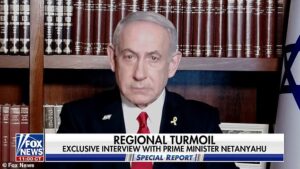
Fears are mounting about the economic impact of the Iran-Israel conflict today as energy prices rise and trade routes face disruption.
Rachel Reeves admitted a 10 per cent spike in oil and gas costs and threats by Tehran to close the Straits of Hormuz were ’cause for concern’.
In TV interviews this morning, the Chancellor stressed energy costs were still lower than ‘a few months ago’ – but said the potential fallout for UK plc was partly driving the UK’s calls for de-escalation.
Ms Reeves dodged questions on whether her already-delicate spending plans would be smashed by the crisis, insisting Britain has a ‘strong economy’.
The comments came as former BP boss Lord Browne warned oil prices would ‘go up a long way’ if Iran shut the Straits of Hormuz.
Deutsche Bank has suggested that such action could see Brent crude hit $125 a barrel – compared to around $74 now.
Former Chancellor Lord Hammond told Sky News that the government was not in a good position to respond to serious disruption because Ms Reeves had not rebuilt the Treasury’s reserve.

Rachel Reeves admitted a 10 per cent spike in oil and gas costs and threats by Tehran to close the Straits of Hormuz was a ’cause for concern’

An explosion in Tel Aviv, Israel, as the clashes with Iran ramp up

Deutsche Bank has suggested that problems in the Straits of Hormuz could see Brent crude hit $125 a barrel – compared to around $74 now
Ms Reeves told Sky News: ‘We’ve already seen in the last few days, for example, oil and gas prices begin to go up’.
‘Over the course of this week, oil and gas prices, oil prices have gone up by just over 10 per cent, they’re still down compared to a few months ago but of course we’re keeping an eye on that,’ she said.
‘And at the same time, as you say trade routes are very important through the Middle East and we’ve seen disruption there in the past, partly because of the Houthi attacks for example.
‘And so that is a cause for concern.’
Pressed how bad the situation could be, she said: ‘It is very early days and things are moving quickly. But when we urge for de-escalation in the region that is in part because of the lives at risk… but also because what happens in the Middle East affects us here at home.
‘It’s why in the Spending Review this week we invested heavily in our defence to keep our country safe.’
Ms Reeves confirmed the UK is deploying military assets to the region to ‘protect ourselves’ and ‘potentially to support our allies’.
She noted that in the past Britain has ‘helped protect Israel’ from ‘incoming strikes’.

Across Israel, air raid sirens sent residents into shelters as waves of missiles streaked across the sky and interceptors rose to meet them (pictured: the effects of an overnight strike in Ramat Gan, Israel)
‘I’m not going to comment on what might happen in the future, but so far, we haven’t been involved, and we’re sending in assets to both protect ourselves and also potentially to support our allies.’
Lord Hammond told Sky News: ‘What she should have been doing of course a long time ago is rebuilding our reserve. But she hasn’t done that…
‘If there’s an economic shock we will be in a much more difficult position in responding to it.’
He added: ‘It’s only if the situation becomes long term sustained that I think there is a risk we could see serious economic disruption.’






